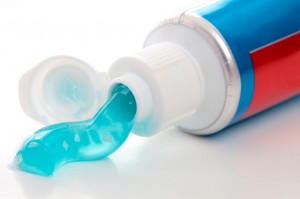 Where is the gluten in toothpaste?
Where is the gluten in toothpaste?
Most of us feel comfortable about grabbing any tube of toothpaste from a drug store without checking if it’s gluten-free toothpaste. We’re pretty confident that it will whiten our teeth and freshen our breath just as it promises to do.
Few of us read the list of ingredients. But anyone who suffers from celiac disease knows that there are some toothpastes that can cause an adverse immune response, leading to pain and discomfort.
To thicken toothpaste, some manufacturers use grain-based products. The proteins in grains, like wheat, rye and barley, can cause inflammation in the small intestine of someone with celiac disease. The inflammation can lead to serious problems. Besides stomach pain and discomfort, malnutrition can occur because of the body’s inability to absorb nutrients. In children, celiac disease can affect growth and development.
What is Gluten-Free Toothpaste?
 Many Americans have decided to go on a gluten-free diet, although only about 1% of the American population has celiac disease. Toothpaste manufacturers have responded to the public’s demand for gluten-free products. Most now use gluten-free thickeners in their products.
Many Americans have decided to go on a gluten-free diet, although only about 1% of the American population has celiac disease. Toothpaste manufacturers have responded to the public’s demand for gluten-free products. Most now use gluten-free thickeners in their products.
The Food and Drug Administration (FDA) allows products to be labeled “gluten-free” if it contains less than 20 parts per million of gluten. The FDA does not test toothpastes, but the American Dental Association (ADA) does.
The American Dental Association Seal of Acceptance is on products that the ADA has deemed safe and effective. Manufacturers must apply to the ADA for the Seal, so not all products are evaluated by the ADA.
Reading the labels and going on to the manufacturer’s website will let you know how much, if any, gluten is in their toothpaste. The ada.org website explains the criteria for evaluating products and has a list of products with the Seal.
How Do You Choose the Right Dental Products?
 If you have questions about the products you are using or any of the products that we use in our office, just ask. We ask every patient who walks through our doors about their health, allergies and if they have special needs.
If you have questions about the products you are using or any of the products that we use in our office, just ask. We ask every patient who walks through our doors about their health, allergies and if they have special needs.
Most of us can use the products we choose at the drug store without having any adverse effects. But those of us with special needs can ask for guidance about which dental products are best. There are also prescription toothpastes and other dental products. These can be more beneficial than over-the-counter products for some patients.
